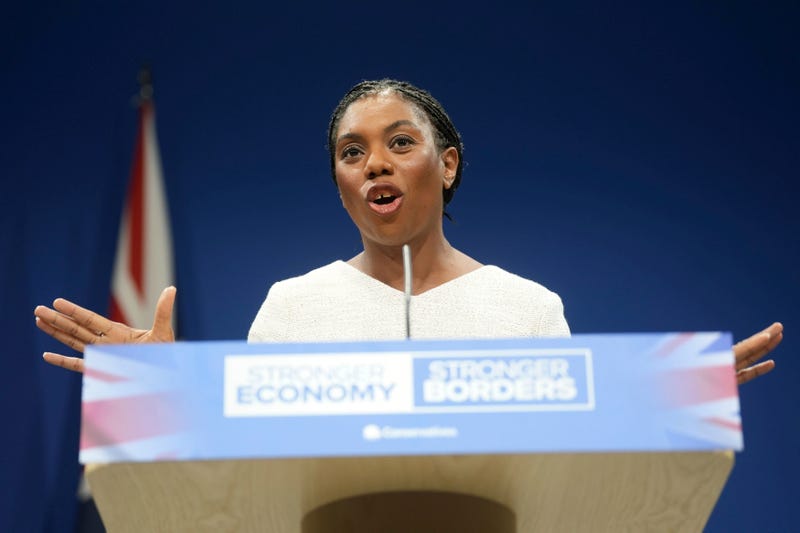
MANCHESTER, England (AP) — Britain’s Conservatives used to boast they were the world’s most successful political party. Not anymore.
The center-right party that governed the U.K. for more than 60 of the last 100 years before being ousted in 2024 is embracing Donald Trump -style policies, including mass deportations and government budget-slashing, as it battles to remain a contender for power.
The Tories are fighting not just the Labour government to their left, but Reform UK to the right. Nigel Farage’s hard-right party has topped opinion polls for months, trounced the Conservatives in May’s local elections and has welcomed a stream of defecting Tory members and officials.
Conservative leader Kemi Badenoch acknowledged that the party has “a mountain to climb” to win back voters.
But in a speech closing the party's annual conference on Wednesday, she insisted the Conservatives are “the only party that can meet the test of our generation, the only party that can deliver a stronger economy and stronger borders.”
A shrunken party
Crowds were thin under the vast vaulted roof of the Manchester Central conference venue, a former railway station in the northwest England city, as delegates absorbed the party’s diminished stature.
“It’s not in a great place at the moment, we’re aware of that,” said Neil McCarthy, a member from northern England. “There needs to be passion, and we need to get the message across that we’ve changed.”
Questions of party competence weren’t helped by Conservative-branded chocolate bars distributed at the conference on which Britain was misspelled as “Britian.”
The Conservatives have endured years of turmoil – some of it of their own making, some of it shared by incumbent parties in a world of economic and geopolitical instability.
The economic benefits of Britain’s 2020 exit from the European Union, championed by those now running the party, have been elusive. Prime Minister Boris Johnson won a huge election victory in 2019 but was ousted by the party in 2022 after a string of ethics scandals.
His successor, Liz Truss, sent inflation and interest rates soaring with a disastrous tax-cutting plan that wrecked the Conservatives’ reputation for economic stability.
Under Rishi Sunak, the government staggered on until the July 2024 election that delivered the Conservatives' worst-ever defeat.
Badenoch, a small-state, low-tax advocate elected leader last year, has shifted the party to the right, announcing policies with a distinct MAGA flavor. She says a Conservative government will scrap carbon emissions reduction targets, sharply cut legal immigration and deport 150,000 unauthorized immigrants a year with a removals force similar to Immigration and Customs Enforcement in the U.S. It would also leave the European Convention on Human Rights and limit the power of judges to block the will of government.
Such policies, which alarm civil liberties groups, are similar to Farage's plans for power, leading some to ask what sets the Conservatives apart from Reform.
Badenoch says the difference is fiscal prudence. She rejected Farage’s promises to increase welfare spending and nationalize key industries such as steel, and said a Conservative government would slash welfare spending to fund lower taxes on businesses and homebuyers.
Jill Rutter, a senior fellow at the Institute for Government think tank, said Badenoch’s attempt to make the Tories “Reform with better economics” risks “narrowing the appeal” of the party.
“Basically, she’s chucking quite a lot of people out of the Conservatives’ broad church,” Rutter said.
Climate-change targets, human rights rules and support for managed immigration were until recently mainstream Conservative positions, and some party members are uncomfortable with the rightward turn.
“I don’t think a lurch to the right is necessarily the solution,” said Elizabeth Rhodes, from Knutsford in northwest England. “I think the Conservative Party has always been a coalition, and if we are going to win again, we’ve got to (still) be.”
Leadership doubts
The government does not have to call an election until 2029, but Badenoch’s poor poll ratings and lackluster performance in Parliament have stirred speculation that she may be ousted long before then.
Prime Minister Keir Starmer faces similar discontent within his Labour Party as Reform destabilizes parties of both left and right.
Conservative lawmaker Robert Jenrick, who lost the 2024 leadership contest to Badenoch, has spent the ensuing months building his online brand, with one popular social media video showed him confronting subway fare-dodgers. He has become one of the party’s loudest anti-immigration voices.
Video published online by The Guardian newspaper showed him remarking that he “didn’t see another white face” in a neighborhood in Birmingham. Jenrick said he was not being racist in expressing concern about “ghettoized communities” and lack of integration.
Jenrick drew large crowds at his conference appearances, where he said the Conservative Party needs to show more “hunger,” while insisting he is loyal to Badenoch.
“The party made its choice,” he said. “Kemi is our leader.”
Jenrick hasn’t ruled out running for leader again, or making a unite-the-right electoral pact with Reform, an idea Badenoch rejects.
Memories of Margaret Thatcher
Facing an uncertain future, many Conservatives are retreating to their happy place: the 1980s, when Prime Minister Margaret Thatcher transformed Britain with her free-market policies.
The Manchester conference hall sported life-size cardboard Thatcher cutouts, tables stacked with biographies of the late leader and bottles of Thatcher whisky for 85 pounds ($114) each. Delegates could dance to 1980s hits at a “retro disco-themed club night celebrating Margaret Thatcher.”
David Davis, a Conservative lawmaker since 1987, said Badenoch could still revive the party as Thatcher once did.
“In the late '70s she was being talked down, too, for precisely the same reasons: a bit too tough, a bit too hard-edged, a bit too dangerous, the policies,” Davis said. “But then we had the (financial) crisis and suddenly Thatcher was the right answer.
“We’re going to have another crisis, and Badenoch will be the right answer too.”